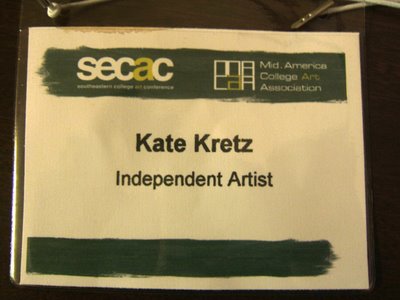 Independent artist.
Independent artist.Ten years ago, I was so proud of wearing my name tag with a university affiliation when I got my first teaching job. This weekend, I was proud to wear this one.
Discussing the fact that I left a tenured position made me realize that, for most artists, it's all about health care. Most artists could get by financially doing part time work or adjuncting, but they need the insurance, especially those with families. I am still going to have to make $$, only my insurance situation has changed. So if our country got on board with a real insurance solution, things would change quite dramatically for artists.
It seems like each conference that I go to ends up having one or two themes that our little group of idealist artists discusses. These are not themes dictated by the conference, but ones that occur in response to trends that we are seeing in the sessions that we attend. We discussed art and religion a great deal (mostly the difference between illustrative devotional images, artists who simply apropopriate the language of their religion and map it onto other things [like yours truly], and artists who might be secretly devout, and create spiritual work, but you would never look at their work and call it religious... spiritual, maybe, but not religious). This topic was not surprising because E. Heartney was around in various capacities this week. The last big topic was how disempowered artists have become. The current marketplace has disempowered critics and curators to a certain extent as well. Art fairs have become "the place" to see art, the place where the action takes place, and as Eleanor put it, you can't review or discuss an art fair, you can only report how much money the art sold for. Collectors are determining which artists are important by how much money they pay for a work of art, the validation is no longer coming from the educated sources that it once did.
We decided that the homework for our little group is think of ways that artists could seize back some power. Sylvie Fortin, who runs ArtPapers magazine, gave a great talk, the first one I have heard in a long time that offered some hope. She was talking about alternate paradigms for art education, where "art students" were essentially getting together, and, in lieu of tuition, were combining their $$ to bring in the visiting artists that the group wanted to hear, outside the context of a university. Not a bad idea, since so many universities are following a corporate model that puts the education of students towards the bottom of their agenda. We need to put our heads together to do similar types of problem solving as professional artists.



0 Comments:
Post a Comment
<< Home